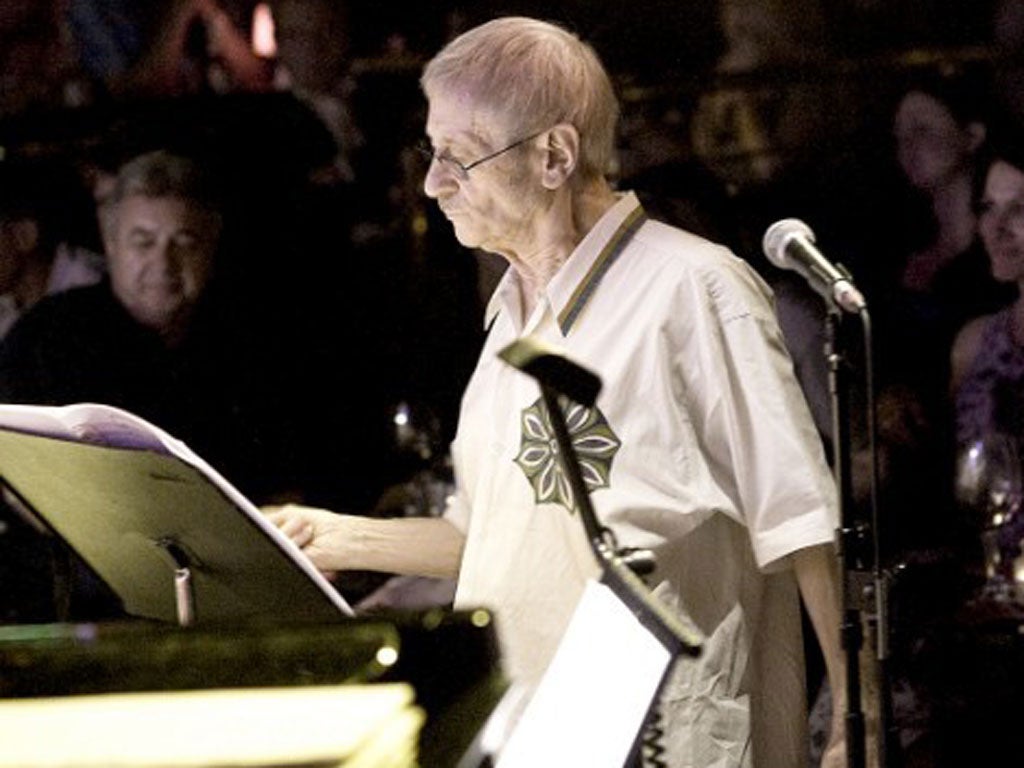Michael Garrick: Composer andpianist hailed for his fusions of jazz and poetry

Duke Ellington had Mrs Clinkscales. Michael Garrick had the no less splendidly named Eleanor B Franklin-Pike, but while Duke may have turned out to be a model pupil, Garrick was banished from the only formal music lessons he took in childhood for smuggling phrases from "In The Mood" into a classical test-piece at a students' concert. Of such are jazz careers made.
Garrick's lasted half a century, only to be cut short when he succumbed to a chronic heart condition while undergoing long-delayed surgery to correct it. He leaves a legacy of more than 30 recordings as composer and group-leader, many others as a pianist, and his sons Gabriel, a trumpeter, and Christian, a jazz violinist, to continue the Garrick name in British music.
The choice of names is significant. Garrick's best known work remains, perversely, his 1968 Jazz Praises at St Paul's, a naturalised – or Anglicanised – version of Ellington's Sacred Concerts but also an extension of his own early fascination with jazz-and-poetry projects, which led him to collaborate with or use texts by Dannie Abse, Thomas Hardy, Vernon Scannell and JRR Tolkien. He also wrote music based on Peter Pan, a Rudolf Steiner lecture on the destination of souls, a dictionary of angels and, most wittily of all, in The Royal Box, on the peculiar language of our tabloid obsession with the royal family. If there is a title that sums him, it is perhaps Mr Smith's Apocalypse, written to poems by John Smith for the 1969 Farnham Festival, suggesting an unusually homely approach to Last Things (his fellow British composer Mike Westwood did something similar with William Blake).
Michael Garrick was born in Enfield, Middlesex, in 1933. He studied English literature at University College London, where he began playing jazz, recording "Blues For The Lonely" with the legendary West Indian saxophonist Joe Harriott, and trumpeter Shake Keane. Garrick remained close to the troubled Harriott, who played with him again on October Woman and Black Marigolds in 1965 and 1966.
Garrick continued to experiment with voices, employing the Elizabethan Singers and John Smith on those records respectively, and introduced Norma Winstone into his group, not as a singer but as an instrumental member of the ensemble. She plays a central part on the superb 1970 LP The Heart Is A Lotus. During the same period, Garrick also held the piano chair in the Ian Carr-Don Rendell Quintet, an important group in the evolution of modern jazz in Britain. Its 1965 Dusk Fire is named after a Garrick composition, and he revived the title last year for an autobiography, subtitled Jazz in English Hands, written with Trevor Bannister.
In the 1970s, Garrick studied at the Berklee School in Boston and became involved in jazz and music education, teaching at Trinity College and the Royal Academy but also leading important summer courses at the Guildhall and, latterly, his own Jazz Academy held at Tunbridge Wells, which also gave rise to a record label of the same name.
One thinks perhaps of Garrick as a composer first and a piano player second, and his small group work, with piano foregrounded, is much underrated. The early Cold Mountain (1972) with Dave Green and Trevor Tomkins is not so much an orthodox piano trio in the Bill Evans manner (Garrick was to include Evans, and Ellington, in an ongoing series of musical "Jazz Portraits") as a bold attempt to write and play orchestrally with a small combo. It remains a strikingly original work.
With the Jazz Academy imprint available to him, Garrick was able to sidestep commercial label indifference and release his own New Quartet and Inspirations in the present decade. Christian and Don Rendell joined him on Parting Is Such in 1995, which put together songs by Canteloube, Lennon & McCartney. and "My Funny Valentine". Green and Pleasant Land also had father and son in a notably quiet set recorded in Missenden Church in Buckinghamshire.
He continued to develop big band projects, including one dedicated to Joe Harriott's music, as well as music for sacred places and occasions. The music characteristically blended elements of English pastoral and American blues, simple diatonic melody and an approach to harmony that was often highly ambiguous and ethereal, but never perfumed. Michael Garrick remained, first and last, a jazz musician. He was awarded an MBE in 2010, an honour he accepted on behalf of the profession as much as for himself.
Michael Garrick, pianist and composer: born Enfield, Middlesex 30 May 1933; MBE 2010; died Harefield, Middlesex 11 November 2011.
Subscribe to Independent Premium to bookmark this article
Want to bookmark your favourite articles and stories to read or reference later? Start your Independent Premium subscription today.

Join our commenting forum
Join thought-provoking conversations, follow other Independent readers and see their replies